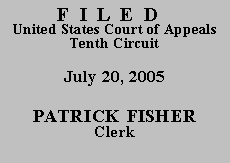

| UNITED STATES OF AMERICA, |
|
| v. | |
| GERARDO RUBEN SALGADO-HERNANDEZ, |
|
Gerardo Ruben Salgado-Hernandez pleaded guilty to re-entering the United States illegally following deportation for conviction of an aggravated felony, in violation of 8 U.S.C. § 1326(a) and (b)(2). The pre-sentence report calculated a proposed imprisonment range of forty-six to fifty-seven months.
Mr. Salgado-Hernandez objected at the sentencing hearing, arguing that the sixteen-point enhancement for a prior "crime of violence" felony conviction was unconstitutional in light of Blakely v. Washington, 124 S. Ct. 2531 (2004). Prior to deportation, he was convicted in Texas state court of indecency with a child under the age of fourteen. The district court overruled his Blakely objection and sentenced him to forty-six months of imprisonment and three years of supervised release. When imposing Mr. Salgado-Hernandez's sentence at the low end of the Guidelines, the district court stated that "the reasons why the sentence might be higher . . . have been adequately addressed by [his counsel], and I don't find any reason to sentence the defendant any higher than the low end of the guideline range, which itself is 46 months and a rather severe punishment." Rec. vol. I, doc. 23, at 10.
While this case was pending on appeal, the United States Supreme Court filed its decision in United States v. Booker, 125 S. Ct. 738 (2005). Booker's holdings apply to all cases on direct review. Id. at 769. As Mr. Salgado-Hernandez's counsel concedes, the sentence enhancement for a prior conviction does not involve a Sixth Amendment constitutional violation. See United States v. Moore, 401 F.3d 1220, 1224-25 (10th Cir. 2005) (holding that "the government need not charge the 'fact' of a prior conviction in an indictment and submit it to a jury," and "determining whether a given felony constitutes a 'violent felony' is a question of law and not fact"). Like the petitioner in Moore, Mr. Salgado-Hernandez does not contend that the district court, when deciding if the prior conviction constituted a violent felony, improperly looked beyond the charging document under Shepard v. United States, 125 S. Ct. 1254 (2005). See Moore, 401 F.3d at 1225 n.2.
However, in light of Booker, the "sentencing court [] err[ed] by applying the Guidelines in a mandatory fashion, as opposed to a discretionary fashion." United States v. Gonzalez-Huerta, 403 F.3d 727, 731-32 (10th Cir. 2005) (en banc). Because Mr. Salgado-Hernandez raised the Blakely objection below, we review the sentencing error for harmlessness. United States v. Labastida-Segura, 396 F.3d 1140, 1143 (10th Cir. 2005).
This court has determined that where a defendant preserves a non-constitutional Booker error and the district court, viewing the Guidelines as mandatory, sentenced him at the bottom of the applicable Guidelines range, we cannot conclude that the error was harmless:
[W]here it was already at the bottom of the guidelines range, to say that the district court would have imposed the same sentence given the new legal landscape (even after consulting the Sentencing Guidelines in an advisory capacity) places us in the zone of speculation and conjecturewe simply do not know what the district court would have done after hearing from the parties. Though an appellate court may judge whether a district court exercised its discretion (and whether it abused that discretion), it cannot exercise the district court's discretion.
Id. Based on Labastida-Segura, the government does not argue harmless error and agrees with Mr. Salgado-Hernandez that this case should be remanded for resentencing. Aple's Br. at 5.
Accordingly, we REMAND to the district court for resentencing in compliance with Booker.
Entered for the Court,
Robert H. Henry
Circuit Judge
*. This order and judgment is not binding precedent, except under the doctrines of law of the case, res judicata, and collateral estoppel. The court generally disfavors the citation of orders and judgments; nevertheless, an order and judgment may be cited under the terms and conditions of 10th Cir. R. 36.3.